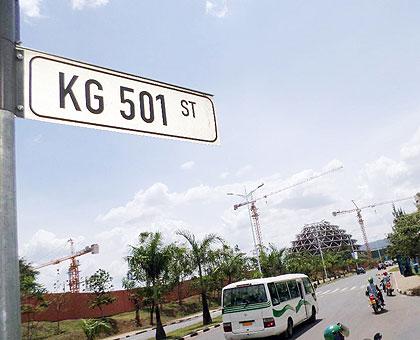A FIRST-TIME visitor to a foreign land may face many challenges, but top among them is often the cultural shock that comes in different dimensions.


A FIRST-TIME visitor to a foreign land may face many challenges, but top among them is often the cultural shock that comes in different dimensions.
George Otieno, a Kenyan civil engineer who came to Rwanda four months ago realised that Kigali’s way of naming streets is different from Nairobi’s. This, he says poses some challenges as he cannot easily get round the city by identifying location using their street numbers.
While the rest of the cities in East Africa generally use names, Kigali is unique having adopted a different form of naming its streets—a combination of numbers and some letters. Thus the road from the MTN Centre passing through Kacyiru is named KG 7.
But in some cities and towns in East Africa countries, this street could have been named according to a major landmark in the area such as the President’s Office. So it would have had a name like "Village Urugwiro Road” or something close to that.
In June last year, it was reported in this newspaper that Kigali City Council had embarked on an ambitious project that would see all the city roads named and addresses allocated.
The project aimed to have all roads, streets and avenues have road signs with a combination of numbers and letters based on the location of the district. For example, if the avenue is located in Gasabo, the street’s name would be, say, KG 14 av. This combination identifies the street number and its type. K stands for Kigali while G stands for Gasabo.
According to Bruno Rangira, the Kigali City spokesman, this system is user-friendly. "Unlike the other systems in neighbouring countries, ours is easy to read for locals and visitors.”
However, there are a number of people like Otieno who say that they are still yet to fully master how to get to their destinations using this system. " While in Nairobi, it was easy for me to tell a taxi driver to drive me to, say, Koinange Street, this is not the case here since it is difficult to tell the driver to take you to, say, KN 16 St. I have to tell him exactly where I’m going without mentioning the street name.”
Dorcas Wahome, a Kenyan, on the other hand says that she doesn’t have problems locating her destination per se, buther biggest challenge is memorising the number of the street. "The numbers and the letters cannot just stick into my head. When I pass a street with a combination of letters and numbers, I easily forget it and to be honest, I still don’t know the names of most of the streets.”
Albert Uwimana, a taxi driver in Kimihurura says that he has experienced no problems with his passengers because of street names since they know exactly where they are going. "Kigali is a small city, unlike other East Africa cities like Nairobi. The passengers know where they are going without bothering to grapple with street names.”
However, he adds that if anyone would ask him to take them to a street using the street names as is in Kigali city; he would be at a loss since he too hasn’t fully mastered the combination of names and numbers used in the city.
Bruno says that there are a number of cities in the world that use such combinations to name their streets and thus Rwanda is not an isolated case.
On another note, he says that street naming that kicked off last year is almost complete with 90% of the streets having been named. "The remaining ones are streets in the outlying areas and we hope to complete this project by December.
He also says that numbering of houses that kicked off at the same time is scheduled to be completed mid next year, adding that so far, most houses adjacent to roads have been allocated numbers.


